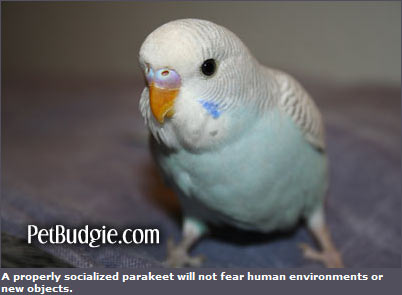|
Socializing Your Parakeet

Socializing a parakeet is
important if you expect these creatures to successfully adapt to
our surroundings. These birds need to be properly socialized
because they have not been domesticated or they have not learned
to adapt or survive in our human surroundings. Unlike dogs and
cats that have had the luxury to coexist with humans for thousands
of years, budgies have only been kept for a few hundred years.
This is not enough time to be classified as domesticated. In
turn, your parakeet needs to be properly socialized to better
accept change and understand our environment.
Socializing a
parakeet takes work and the best time to start the process is
while the parakeet is young. It should be noted that socializing
is a process that never ends. Your parakeet will constantly need
to adjust to new surroundings, new objects, and new people. How
you start the process will make all the difference to how the bird
will react and accept things later on as an adult and life.
When parakeets
are babies, they are very impressionable. In fact, their minds
are starting the imprinting process. During this process the
brain is making all kinds of connections as to what is going on in
its environment. And through talking with many pet owners and
studying pet budgies, I believe the most impressionable time is
during the first year. It is during this year that most parakeets
talk, become mature, and learn about their environments. Because
the parakeets are learning so much during this crucial
developmental window, it is important you expose your budgie to
anything you can.
The first and
most important thing is to socialize your budgie to different
foods. We always hear how budgies refuse to eat fruits,
vegetables, or pellets. This is because most of the parakeets
were not properly socialized or exposed to new foods. To avoid
this problem, start offering your budgie all kinds of foods
daily. Keep things interesting and keep rotating between pellets,
vegetables and fruits. The sooner the parakeet learns to enjoy
foods, the healthier and longer your bird will live.
The next
important thing to do is teach your parakeet to accept change.
This can be done by changing the environment regularly, changing
the toys around in the cage, moving the cage in many different
places, or moving the play stand in different rooms. Change is
important because parakeets that do not accept or understand
change can develop physiological problems. Keep things random and
although a schedule is important, it is also just as important to
change things around a bit.
Teaching your
parakeet to be independent is also important. People tend to make
the mistake of unintentionally teaching the bird to only thrive
when their owners are around. Though this may seem like a good
idea, it really does more harm than good. Budgies that have not
leaned to be independent can pluck their feathers or mutilate
themselves. In the wild all parents force their fledglings to
become independent. Only after they have learned this skill do
they start to find a mate and move on to nesting. This means that
you must teach the parakeet to entertain itself while you are out
through toys and other stimulants. It is highly recommended you
expose your parakeet to toys and obstacles while you are out.
Place a radio or leave the television on to help entertain the
bird. You can even place the cage by a window (away from direct
sun light) so the bird can look out while you are gone. The
process needs to be continued and you need the parakeet to play on
its stand without your assistance.
Being
independent does not mean it is okay to let the parakeet be alone,
it only means the bird must be able to cope with your absence. A
parakeet is a social animal and will suffer if it does not receive
interaction from you or another budgie.
Again, remember
that socializing your parrot is an ongoing task that will never
end. Budgies have the ability to learn throughout their lives and
it is up to you to stimulate their curiosity and keep them
active. They are confined to a cage daily and because of this,
they need to be shown there is life beyond the cage bars. If you
properly socialize your bird you will have a better rounded and
less phobic creature that will bring countless hours of joy into
your life. |

